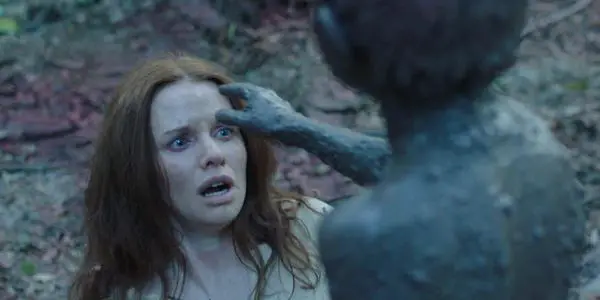Religious lore has long been an overarching theme in horror storytelling. Chiding common belief structures with moral crossroads or simply questioning one’s faith when they might be at their most vulnerable have been a mainstay of the genre. All too often steeped in Catholicism, it is refreshing when storytellers shy away from overused themes in lieu of lesser known religious concepts.
The Golem, directed by Doron Paz and Yoav Paz, attempts to breathe new life into the Hebrew legend of an autonomous brute made from earth and clay and brought to life by a mystical spell in order to serve as a protector for its creator. In this retelling of the tale, writer Ariel Cohen changes the dynamic of the story in an interestingly sharp way by making the silent monster a child to a grieving mother.
Hanna, played powerfully by Hani Furstenbergin, is the wife of a rabbi who had recently lost a child. Engulfing herself in the deeper teachings of Judaism to find solace in her loss, she learns of rituals beyond her control. Threatened by another village, Hanna conjures a Golem to protect her own only to shares a kinship with the violent being who resembles her son.
A Deeply Rooted Legend
The origins of the Golem reach far back into early Judaism. Depicted as a neither good nor evil, the stories associated with the character seem to waver depending on its purpose and creator. Like any weapon, the Golem represents an extension of ourselves and the intent comes from whoever claims power over it. But even when wielded justly, the results might come with grim ramifications for the user.

Not the first movie to tackle the subject, filmmakers have adapted the Golem story as far back as 1915 with Der Golem, directed oddly enough by another pair of directors, Paul Wegener and Hedrik Galeen. Depicted as an almost Frankenstein’s Monster, the Golem in concept has stayed pretty true to the core iteration of a hulking silent beast created through hubris or desperation. A depiction still represented in this retelling, cutting deeper by a maternal bonding element.
Both Beautiful And Bland
The film takes place in 1673 Lithuania, and the production does a stunning job convincing the audience of such. Sets and costumes shine with rustic believability though not nearly as well as the cinematography. Beautiful landscapes blend a palette of vibrant colors captured with an engaging balance of peace and dread. Normally this would be a plus to capture on film, but here the shots are hindered by an overly dour narrative which rarely matches the calming backdrop. Much of the plot takes place during the day. Not ideal for a moody horror film when many of the shots would have been better used in a sweeping period drama.
With the runtime of one hour and thirty-five minutes, one would suspect some Golem action early on. But alas, brooding character development takes its time to spin a very simple story, grossly omitting the titular character until just after the forty-minute mark. Nothing feels serious until it is, even if the plot says otherwise. Little tension is brought to the surface when addressing what is to be done with the Golem child. Sure, scenes of pitter-pattered footsteps and strange noises coming from the attic shroud the creature in mystery, but after wading through jumpscares for one short scene little to no startling moments seem to follow.
The Golem: It Comes Down To Story
My initial hopes for The Golem was to find a taught retelling of an ancient tale, building a chilling narrative about an unassuming evil unleashed out of misguided emotions. And as much as those themes are present, the time the film takes to make this happen is far longer than needs to be invested. It’s not without its merits, as the acting is excellent and the subplots are interesting. The depiction of marital tension after the loss of a child plays effectively in the scenes between Hanna and her husband Benjamin, played by Ishai Golan with quiet tooth-clenched anger. Even still, the film lacked bite.
With the exception of a few bloody effects and the presence of an evil child, somehow to call The Golem a horror film is misleading. A gory thriller perhaps, but not true horror. It is not frightening. More moody and tense, but nary a scare to be found.
Pros and cons weighted in, The Golem is a slight recommend for those who enjoy a slow burn in their horror fare, at an hour thirty-five the commitment of the viewer is breezier than it feels. If paced more efficiently, this could have definitely satisfied a broader audience, but instead, we are left with lackluster horror mixed with a decent drama.
Religion in horror has always been a tried and true sub-genre of terrifying cinema. What are some favorite theological based horror flicks?
The Golem is now available on DVD, BluRay and streaming platforms.
Does content like this matter to you?
Become a Member and support film journalism. Unlock access to all of Film Inquiry`s great articles. Join a community of like-minded readers who are passionate about cinema - get access to our private members Network, give back to independent filmmakers, and more.